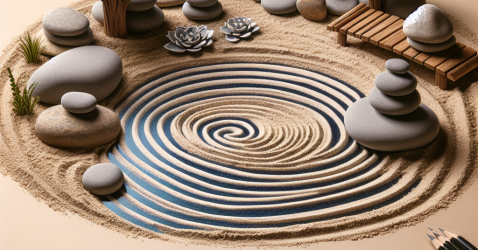4 Benefits of Minimalist Living for Self-Care
In today’s fast-paced world, finding time for self-care can often feel like a daunting task. However, with minimalist living, you can simplify your life and create a self-care routine that is both effective and easy to maintain. By focusing on the things that bring you joy and eliminating unnecessary clutter, you can prioritize self-care without feeling overwhelmed. This article explores the concept of forging a self-care routine with minimalist living, offering practical tips and inspiring ideas to help you achieve a healthier and more balanced lifestyle.
What is Minimalist Living?
Minimalist living is a lifestyle approach that focuses on decluttering and simplifying various aspects of your life. It involves intentionally reducing excess physical possessions, simplifying daily routines, and creating a mindful space. The core idea behind minimalist living is to prioritize quality over quantity, emphasizing only what truly adds value and meaning to your life. By embracing minimalism, you can cultivate a sense of peace, balance, and intentionality in your day-to-day life.
Understanding Self-Care
Self-care is the practice of taking deliberate actions to prioritize and nurture your physical, mental, and emotional well-being. It involves recognizing your own needs and making choices that promote overall health, happiness, and fulfillment. Self-care is not selfish; it is an essential aspect of maintaining a positive and balanced lifestyle. By prioritizing self-care, you can effectively manage stress, boost your mood, and enhance your quality of life.
Benefits of Minimalist Living for Self-Care
Minimalist living and self-care go hand in hand, as both focus on simplifying and enhancing various aspects of your life. By adopting a minimalist lifestyle, you can experience several benefits for your overall well-being:
- Reduced stress: Clutter and excess belongings can create a constant sense of chaos and overwhelm. By decluttering your physical and mental space, you can reduce stress and create a more peaceful environment.
- Improved mental clarity: Minimalism encourages you to let go of distractions and focus on what truly matters. This clarity allows you to prioritize your own needs and make intentional choices that support your well-being.
- Increased time and energy: Maintaining a minimalist lifestyle means spending less time and energy on managing and maintaining possessions. This newfound time and energy can be redirected towards self-care activities that rejuvenate and energize you.
- Enhanced mindfulness: Minimalism encourages you to be present in the moment and appreciate what you have. By cultivating mindfulness, you can improve your mental well-being and strengthen your connection with yourself.
Creating a Mindful Space
Creating a mindful space is an essential aspect of minimalist living and self-care. It involves decluttering and simplifying your environment, designing a minimalistic interior, and integrating natural elements to promote a sense of peace and tranquility.
Decluttering and Simplifying Your Environment
Start by decluttering your physical space, one area at a time. Sort through your belongings and get rid of anything that no longer serves a purpose or brings you joy. Embrace the concept of minimalism by only keeping items that you truly need and cherish. As you declutter, you’ll experience a sense of liberation and achieve a more organized and serene living environment.
Designing a Minimalistic Interior
When designing a minimalistic interior, focus on clean lines, simplicity, and functionality. Choose neutral colors and minimalist furniture pieces that contribute to a sense of calmness. Avoid excessive decorations and aim for a clutter-free aesthetic. By creating a minimalist interior, you’ll establish a visually appealing and peaceful space that supports your well-being.
Integrating Natural Elements
Bringing natural elements into your living space can further enhance the mindful and serene atmosphere. Incorporate plants, natural materials, and soft natural lighting into your decor. Nature has a calming effect on the mind and body, and by integrating it into your surroundings, you can experience a greater sense of tranquility.
Building Healthy Habits
Adopting healthy habits is another crucial aspect of minimalist living and self-care. By prioritizing sleep and rest, nourishing your body with nutritious food, engaging in regular physical activity, and practicing mindfulness and meditation, you can enhance your well-being and lead a more balanced lifestyle.
Prioritizing Sleep and Rest
Adequate sleep and rest are fundamental to your physical and mental health. Make sleep a priority by establishing a consistent bedtime routine, creating a peaceful sleep environment, and prioritizing relaxation before bed. Ensure you have a comfortable mattress and bedding that support quality sleep. By prioritizing sleep and rest, you’ll have more energy, improved focus, and an overall better sense of well-being.
Nourishing Your Body with Nutritious Food
Nutrition plays a vital role in your overall health and well-being. Adopt a minimalist approach to your diet by focusing on whole, unprocessed foods. Prioritize nutrient-dense meals that provide your body with the essential vitamins, minerals, and antioxidants it needs. Avoid excessive consumption of processed and sugary foods, as they can negatively impact your energy levels and mood.
Engaging in Regular Physical Activity
Regular physical activity is essential for maintaining a healthy body and mind. Incorporate exercise into your daily routine in a way that aligns with your preferences and lifestyle. It can be as simple as taking a daily walk, practicing yoga, or participating in a sport or activity that you enjoy. Engaging in regular physical activity not only improves your physical health but also releases endorphins, boosts your mood, and reduces stress.
Practicing Mindfulness and Meditation
Mindfulness and meditation practices can help you cultivate a greater sense of awareness and presence. Set aside dedicated time each day to practice mindfulness or meditation. This can involve sitting quietly, focusing on your breath, or engaging in guided meditation. By being fully present in the moment, you can reduce stress, enhance your mental well-being, and improve your overall self-care.
Embracing a Digital Detox
In our technology-driven world, it is essential to embrace a digital detox to prioritize self-care and mental well-being. By limiting screen time, curating your digital spaces, and establishing tech-free zones, you can create a healthier relationship with technology and enhance your overall well-being.
Limiting Screen Time
Excessive screen time can lead to increased stress, decreased productivity, and disrupted sleep patterns. Set boundaries around your screen time by consciously reducing your usage. Allocate specific periods of the day for using devices and prioritize offline activities that promote self-care and personal growth.
Curating Your Digital Spaces
Curating your digital spaces, such as your social media feeds and email subscriptions, is vital for maintaining a positive and uplifting online presence. Unfollow accounts that bring negativity or comparison into your life and instead choose to engage with content that inspires and uplifts you. By curating your digital spaces, you can create a more supportive and nourishing online environment.
Establishing Tech-Free Zones
Establishing tech-free zones in your home or specific time periods throughout the day allows you to disconnect from technology and focus on self-care. Designate certain areas, such as the bedroom or dining room, as tech-free zones to promote relaxation and connection with yourself and your loved ones. By creating boundaries around technology, you can foster a healthier and more balanced relationship with it.
Fostering Emotional Well-being
Fostering emotional well-being is a vital aspect of self-care and minimalist living. By setting boundaries, cultivating relationships that energize you, engaging in creative activities, and journaling and reflecting, you can nurture your emotional health and create a more fulfilling life.
Setting Boundaries and Saying No
Setting boundaries is essential for maintaining your emotional well-being. Learn to say no to commitments that do not align with your values and priorities. Prioritize your own needs and ensure that you have time and energy for activities that bring you joy and fulfillment. By setting boundaries, you can create a healthier and more balanced lifestyle.
Cultivating Relationships that Energize You
Evaluate your relationships and surround yourself with individuals who support and energize you. Cultivate relationships that are built on mutual respect, trust, and growth. Limit your time and energy spent on toxic or draining relationships, and instead focus on nurturing connections that bring positivity and happiness into your life. Healthy relationships are an essential component of emotional well-being.
Engaging in Creative Activities
Engaging in creative activities allows you to express yourself and channel your emotions. Explore activities such as painting, writing, dancing, or playing a musical instrument. Find joy in the process rather than focusing on the end result. By incorporating creativity into your life, you can foster emotional well-being and tap into your inner sense of fulfillment and self-expression.
Journaling and Reflection
Journaling and reflection provide an outlet for self-expression and inner exploration. Take time each day to write down your thoughts, emotions, and goals. Reflect on your experiences and celebrate your achievements. Journaling can help you process emotions, gain clarity, and identify areas for personal growth. By incorporating this practice into your self-care routine, you can foster emotional well-being and self-discovery.
Implementing a Self-Care Routine
Implementing a self-care routine is essential for ensuring that you prioritize and maintain your physical, mental, and emotional well-being. By identifying your priorities, creating a daily self-care checklist, and scheduling regular self-care activities, you can establish a consistent and effective self-care routine.
Identifying your Priorities
Start by identifying what matters most to you and what areas of your life require attention and care. Reflect on your values and goals, and consider how self-care can support them. This self-reflection will help you determine where to direct your energy and establish your self-care priorities.
Creating a Daily Self-Care Checklist
Develop a daily self-care checklist that includes activities aligned with your priorities. This can include simple practices such as meditating, stretching, reading a book, or taking a bath. Incorporate activities that nourish your body, mind, and soul. By having a checklist, you can ensure that you are consistently engaging in activities that promote self-care.
Scheduling Regular Self-Care Activities
Schedule regular self-care activities into your daily, weekly, and monthly routines. Dedicate specific time for activities that require more commitment, such as a yoga class or a spa day. Prioritize these activities as non-negotiable appointments with yourself. By scheduling regular self-care activities, you can maintain a consistent and sustainable self-care routine.
Sustaining Motivation and Adaptability
Sustaining motivation and adaptability is crucial when incorporating self-care into your minimalist lifestyle. By finding inspiration in minimalism, celebrating small wins, and adjusting your routine as needed, you can stay motivated and adaptable in your self-care journey.
Finding Inspiration in Minimalism
Draw inspiration from the principles and stories of minimalism. Seek out books, blogs, podcasts, and documentaries that explore minimalism and its positive impact on well-being. Surround yourself with like-minded individuals who share their minimalist journeys. By finding inspiration, you can stay motivated and committed to your minimalist and self-care practices.
Celebrating Small Wins
Acknowledge and celebrate your progress along the way. Recognize and appreciate the small wins you achieve through your self-care and minimalism efforts. Celebrating milestones, no matter how small, will boost your motivation and encourage you to keep going. By focusing on your achievements, you can maintain a positive mindset and foster a sense of satisfaction.
Adjusting Your Routine as Needed
Your self-care routine should be flexible and adaptable to changing circumstances. As your needs evolve, be open to adjusting your routine accordingly. Listen to your body and mind, and make necessary shifts to ensure you are providing yourself with the care and nourishment you require. By being adaptable, you can sustain your self-care routine in the long run.
Final Thoughts
The ongoing journey of self-care with minimalist living is a continuous process of self-discovery, growth, and well-being. By embracing minimalism and incorporating self-care practices into your daily life, you can create a sense of peace, balance, and fulfillment. Remember, self-care is not a luxury, but a necessity to prioritize your physical, mental, and emotional health. Take the time to nurture yourself and forge a Self-Care Routine with Minimalist Living.

















